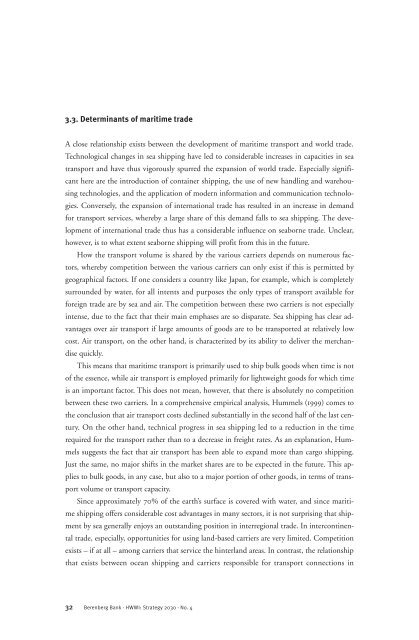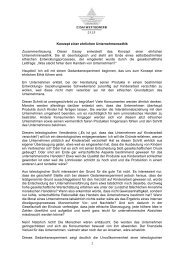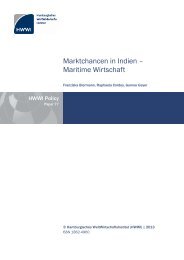Maritime Trade and Transport - HWWI
Maritime Trade and Transport - HWWI
Maritime Trade and Transport - HWWI
Create successful ePaper yourself
Turn your PDF publications into a flip-book with our unique Google optimized e-Paper software.
3.3. Determinants of maritime trade<br />
A close relationship exists between the development of maritime transport <strong>and</strong> world trade.<br />
Technological changes in sea shipping have led to considerable increases in capacities in sea<br />
transport <strong>and</strong> have thus vigorously spurred the expansion of world trade. Especially significant<br />
here are the introduction of container shipping, the use of new h<strong>and</strong>ling <strong>and</strong> warehousing<br />
technologies, <strong>and</strong> the application of modern information <strong>and</strong> communication technologies.<br />
Conversely, the expansion of international trade has resulted in an increase in dem<strong>and</strong><br />
for transport services, whereby a large share of this dem<strong>and</strong> falls to sea shipping. The development<br />
of international trade thus has a considerable influence on seaborne trade. Unclear,<br />
however, is to what extent seaborne shipping will profit from this in the future.<br />
How the transport volume is shared by the various carriers depends on numerous factors,<br />
whereby competition between the various carriers can only exist if this is permitted by<br />
geographical factors. If one considers a country like Japan, for example, which is completely<br />
surrounded by water, for all intents <strong>and</strong> purposes the only types of transport available for<br />
foreign trade are by sea <strong>and</strong> air. The competition between these two carriers is not especially<br />
intense, due to the fact that their main emphases are so disparate. Sea shipping has clear ad -<br />
vantages over air transport if large amounts of goods are to be transported at relatively low<br />
cost. Air transport, on the other h<strong>and</strong>, is characterized by its ability to deliver the merch<strong>and</strong>ise<br />
quickly.<br />
This means that maritime transport is primarily used to ship bulk goods when time is not<br />
of the essence, while air transport is employed primarily for lightweight goods for which time<br />
is an important factor. This does not mean, however, that there is absolutely no competition<br />
between these two carriers. In a comprehensive empirical analysis, Hummels (1999) comes to<br />
the conclusion that air transport costs declined substantially in the second half of the last century.<br />
On the other h<strong>and</strong>, technical progress in sea shipping led to a reduction in the time<br />
required for the transport rather than to a decrease in freight rates. As an explanation, Hum -<br />
mels suggests the fact that air transport has been able to exp<strong>and</strong> more than cargo shipping.<br />
Just the same, no major shifts in the market shares are to be expected in the future. This ap -<br />
plies to bulk goods, in any case, but also to a major portion of other goods, in terms of transport<br />
volume or transport capacity.<br />
Since approximately 70% of the earth’s surface is covered with water, <strong>and</strong> since maritime<br />
shipping offers considerable cost advantages in many sectors, it is not surprising that shipment<br />
by sea generally enjoys an outst<strong>and</strong>ing position in interregional trade. In intercontinental<br />
trade, especially, opportunities for using l<strong>and</strong>-based carriers are very limited. Competition<br />
exists – if at all – among carriers that service the hinterl<strong>and</strong> areas. In contrast, the relationship<br />
that exists between ocean shipping <strong>and</strong> carriers responsible for transport connections in<br />
32 Berenberg Bank · <strong>HWWI</strong>: Strategy 2030 · No. 4

















